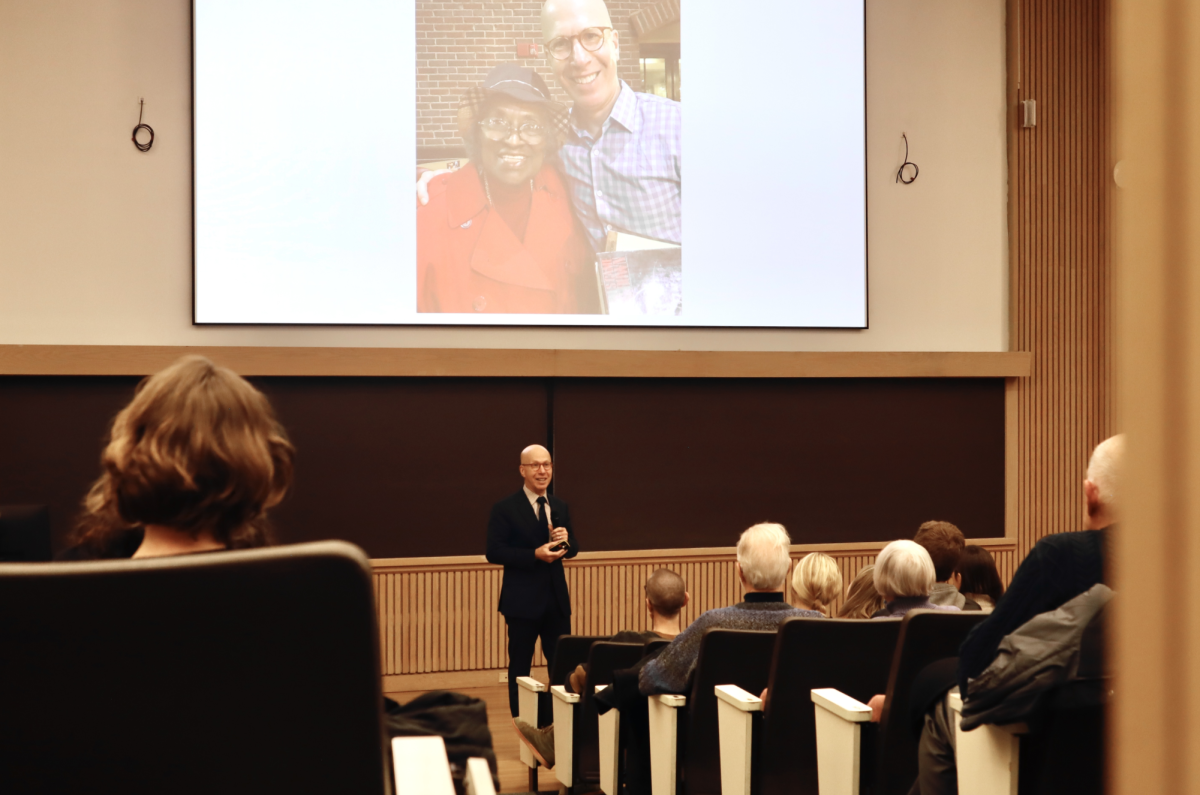Colgate University hosted Jonathan Eig to give a talk on the legacy of Martin Luther King Jr. — “Beyond The Dream: Embracing a More Complicated Martin Luther King” — on Tuesday, Feb. 11. In 2024, Eig won the Pulitzer Prize in Biography for his 2023 book “King: A Life.”
Reported by The New York Times as the “The New Definitive Biography of Martin Luther King Jr.,” the book is one of the first biographies about King in decades. It chronicles King’s life through interviews that Eig conducted and FBI files that he investigated.
Before becoming a biographer, Eig worked as a journalist, including at newspapers such as The Dallas Morning News and The Wall Street Journal. To his surprise, his career path made him eligible for a different kind of Pulitzer Prize than originally thought possible.
“I always dreamed of winning a Pulitzer, and I thought that if I ever won one, it would be for journalism. I never thought that I would be in the biography category,” Eig said.
Eig gave a talk at Colgate due, in part, to the importance of the Colgate connections he had in writing the book. At The Dallas Morning News, Eig was friends and colleagues with fellow reporter Daniel Cattau ’72, a Colgate alumnus. At Colgate, Cattau knew Professor of Philosophy and Religion and University Chaplin Emeritus Coleman Brown, one of the namesakes of Brown Commons, who was working on his dissertation on King at the time. Years later, during Eig’s writing process, he asked Cattau to assist with edits, and Cattau finally read Brown’s dissertation in full. For the book, Eig also interviewed Irene Brown, widow of Coleman Brown and the other namesake of Brown Commons, who was in the audience for Eig’s talk.
Colgate Professor of History and Chair of the Department of History Dan Bouk also attended the talk with students from his history honors seminar. At the beginning of the talk, he gave Eig an introduction and related words from Cattau, who was unable to make it. Bouk commented on the book and the event.
“I read the book right around when it came out, and I thought it was a remarkable story in its own right, and we had heard from this alum, [Cattau], that there was a possibility of him coming to talk here […], and we’d been trying to get him to come now for a couple of years — just struggling to get all of the pieces to work out,” Bouk said.
Stressed in the talk and in speaking with Eig was the sentiment that King has become more of a symbol than an individual human in his legacy. Eig explained how he realized there were untold parts of King’s life after speaking with living people who knew King for his biography “Ali: A Life.”
“When I was working on my book about Muhammad Ali, I was meeting people who knew Martin Luther King […] in a way that we had lost sight of,” Eig said. “I just thought it would be really useful to write a book that would show more of his humanity as a more intimate portrait.”
As part of his research, Eig looked at released FBI documents that had not previously been explored in depth. In light of these files, Eig attested to the importance of history not being definite, underscoring the importance of searching for the stories not told or suppressed.
“There were some things that I discovered that really no one else had found yet. In the case of FBI material, there was stuff that had been released, but very few people had looked through it. This was the first book that makes use of the FBI documents,” Eig said. “It’s one reason why we need biographies for important subjects every so often, every generation, because there’s new material, and that new material can change our understanding of that history.”
Commenting on the wiretaps, Eig noted how they particularly contribute in allowing people to see King’s more human side.
“They help us see more of his personal side ironically because we can read the transcripts of those phone calls and we can see how sad he is and how he feels like no one’s listening to him anymore and that his work is in vain. It makes him have such a more human portrait and it also helps us better understand just how racist the FBI was,” Eig said.
In both his talk and book, Eig conveyed how King did not intentionally pursue a path to become the monumental figure that he ended up being.
“Someone like King wasn’t preordained to be a leader, and he wasn’t really interested in the job. When he was in college, he was thinking about being a preacher, maybe a professor, so life takes you in unexpected directions, and he was willing to follow the changes in life and stepped into this leadership position because he thought that he could be helpful,” Eig said.
With Eig raising why King became a leader for the civil rights movement, Eig touched on why he himself decided to write this new biography. He acknowledged how tackling King as the subject of a biography presented the risk of failing to honor him as such a prolific figure.
“This book was probably the most challenging just because King is such a huge figure and because so much had been written about him in the past. The bar was higher,” Eig said. “Because he was such a beloved figure, especially in the Black community and all over the world, I felt the risk of failure was even greater. I had to work even harder to make sure I did honor to the subject.”
Eig listed several other challenges he faced and risks he considered when embarking on telling the story.
“Some people were worried that because I was white I would be criticized for writing about Black history,” Eig said. “Some people were worried that I would be criticized because I was writing about King’s personal life, his failures, his sexual activity, his mental health struggles and that some people wouldn’t want to read a book about something negative, so I kept all of that in mind, but I just didn’t take it all,” Eig said. “I thought about it, but I didn’t let it stop me because I thought that it was important, that King deserved a new biography.”
Cattau shared his thoughts on the importance of reporting and writing regarding storytelling. He described how the support he received from Colgate professors encouraged him personally to pursue this end, which ultimately brought him to his collaboration with Eig.
“This is the thing I always loved about Colgate — nobody told me this was crazy, which it was,” Cattau said.
Another one of the choices that Eig made was to highlight the involvement of King’s wife, Coretta Scott King, in his life. In his talk, he explained how she originally wanted to pursue vocal performance, but she settled into becoming a music teacher. Coretta Scott King grew to support King in her role as a preacher’s wife while driving his choices at the same time with a passion for activism.
Senior Emma Herwig, a student in Bouk’s seminar, shared her own thoughts on reading the book. For the class, the seniors read the book and were able to meet with Eig earlier in the day to ask questions. Herwig expressed her appreciation for Eig’s writing of Coretta Scott King.
“I love how he treats Coretta Scott King, MLK’s wife, as this really rich, well-rounded, nuanced person. He talks a lot about her personal goals in marrying him and how she saw her future looking,” Herwig said.
While there is much for the people to learn about King from the book, Eig reflected on what he learned about himself in the process.
“It made me think a lot more about faith. I’m not super religious, but trying to understand how King met these challenges over and over again and never gave into fear and never thought about himself and was willing to risk his life for his work […] makes me appreciate the importance of religion in his life, and it made me think about what I would be willing to sacrifice […], if there was anything that I would be willing to risk my life for in the way that he did,” Eig said.
According to Eig, “King: A Life” has induced emotional reactions from those who have read it. He specified how its impact is grounded in what it does differently from other biographies, especially his shedding light on mental health.
“I’ve had people come up in tears saying, ‘I didn’t know Dr. King suffered from mental health issues and it makes me feel better about my own challenges with depression.’ And that’s been really moving to me that a book can still have that kind of an impact,” Eig said.
Herwig in particular detailed how the book has shaped the way in which she regards King.
“Reading the book made me feel like I knew nothing about Martin Luther King the rest of my life. I think how King is taught in schools — like I’ve been learning about King since kindergarten — he’s been really sanitized and just reduced to this idea of who he really was,” Herwig said.
Herwig also commented on the book’s importance at Colgate and beyond.
“I think this is a really important book to read,” Herwig said. “I’m really glad that Colgate brought him here because this is a really important reckoning to be having right now individually in this present moment nationally.”















